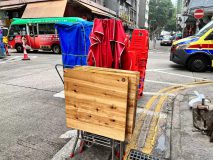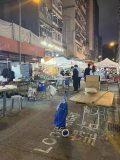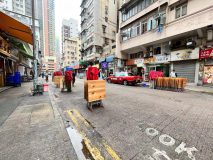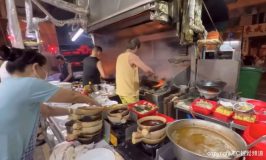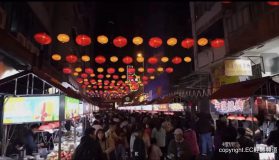Link to podcast: https://youtu.be/LqHAkbYQ2V8
Transcript:
Albert: Good evening, everyone. Welcome to join us! I’m Albert.
Yuna: I’m Yuna.
Albert: Today we will focus on Dai Pai Dong in Hong Kong. Since the reopening of. Temple Street Night Market on December 15, 2023, business has surged. The proportion of visitors to Temple Street has steadily increased. However, some restaurants in north Temple Street have reported a turndown in their usual customer flow due to the night market’s popularity. As we delve into this issue, we’ll explore the underlying causes and potential solutions for the traditional Dai Pai Dong culture facing constraints in the northern part of Temple Street.
Albert:The imbalance in managing mobile stall policies significantly contributed to the. decline of Dai Pai Dongs in Hong Kong. Since 1972, the cessation of issuing necessary operational licenses has greatly restricted their viability. Additionally, analysts highlight the Food and Environmental Hygiene Department’s increasing enforcement on hygiene and public appearance, further displacing traditional food stalls. Another issue is the soaring cost of stall operation. With rents reaching between 16 to 30 million, it has placed immense pressure on vendors amid a sluggish consumer market.
Yuna:The remaining feature of Dai Pai Dongs is restaurants extending their tables onto streets to accommodate more diners at peak hours, against the Food and Environmental Hygiene Department’s regulations that prohibit street obstruction, risking a HK$6,000 fine under specific ordinances. However, many restaurants, due to their small frontages, find this necessary to accommodate more diners simultaneously.
Yuna:Between the 1940s and 1990s, Temple Street was bustling with unlicensed food stalls and dai pai dongs, serving mainly local shoppers. It was a hub for locals seeking affordable goods, from trendy apparel to knock-off electronics. However, post-2000, tighter regulations and commercialization led to the remaining vendors needing specific licenses to operate. Since 2007, in a move to preserve the cultural heritage of Dai Pai Dongs, the government has launched initiatives including the revitalization of Temple Street Night Market. These measures aim to offer a lifeline to this iconic aspect of Hong Kong’s culinary scene.
Interviewing:
Yuna: I have noticed that you set up tables in the middle of the road during the late market so that you can accommodate more diners at the same time. When did this start?
Albert: It must have been around 2000, about the third year of operation, when our patronage increased substantially to the extent that six tables were simply not enough, so we thought of setting up two additional tables at the roadside when there were no inspections by the FEHD. At that time, the FEHD’s control over restaurants was very strong, and many on-street cooked food stalls were driven away; At the same time, claypot rice was becoming popular, and many customers found our cooking authentic, so there were particularly many repeat customers. I think this is the reason why we want to increase the number of tables.
Yuna: I think you should be aware of the FEHD’s policy of prohibiting the occupation of public areas, right? Don’t you worry about blocking vehicles?
Albert: Yes, of course. According to the regulations, all the restaurants on our street have to be fined $6,000. But since Temple Street to the south was converted into a night market, Temple Street has been completely truncated. So generally speaking there are no vehicles traveling on it.
Yuna: As time goes by, many stores have been moved to larger malls like Langham Place for better environment and more concentrated customer flow. Have you ever thought of moving to those shopping centers?
Albert: Yes and no, I may say. Shopping centers do have the advantages as you mentioned, however, it is followed by the higher cost and more severe competitions. We want to preserve the culture of Dai Pai Dong. It is an important part of our civil culture that has been existed for many years. You can eat in shopping malls in almost every place, but you can only have authentic Dai Pai Dong here. This is also the way tourists experience our culture. We don’t want it to vanish.
Yuna: Many neighborhood restaurants have responded to officials that they have been “robbed” by the night market and that the flow of people has dropped dramatically. At the same time, there are also many people who think that the FEHD’s requirements for restaurants in the northern section of Temple Street are more stringent, and there is an unfairness in the policy. What do you think?
Albert: It is true that our revenue has dropped slightly, and the FEHD always asks restaurants to remove the table on the street, but for the night market on the other side, which has been carefully built up to cater for tourists’ consumption preferences, the officials always give the green light, which is not quite fair in my opinion. I hope we can all sit down and talk it over and be able to rewrite the rules to suit everyone.
Yuna: Oh yes, I hope it would be achieved in the future.
Yuna: That’s all for today’s news. Again, thank you Mr. Chen for joining us. We hope the government can put more emphasis on the preservation of Dai Pai Dong in the future.
Chen Haodong 3035974030
Wang You 3036260278
5 stills:
